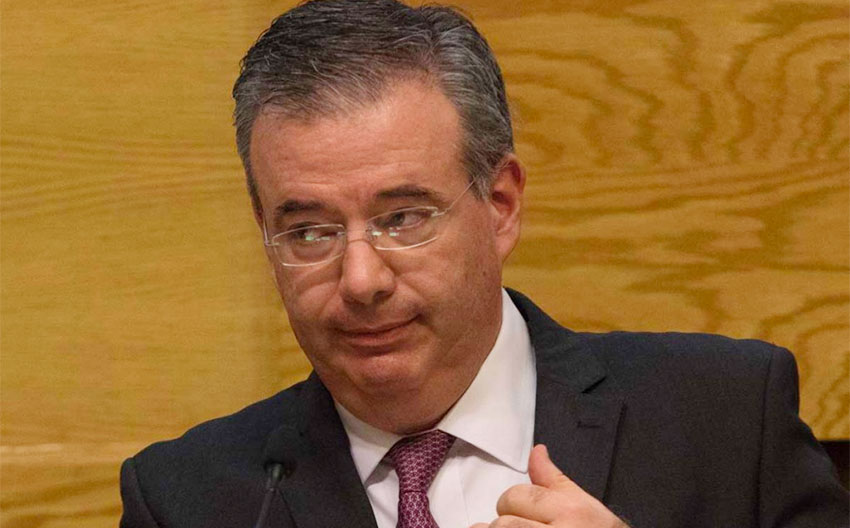Legislation passed Wednesday by the Senate that would force the central bank to buy up all foreign cash that commercial banks can’t trade or sell abroad attracted heavy criticism on Thursday, even from the Bank of México itself.
The bill must still be passed by the lower house of Congress to become law. The ruling Morena party, which has a majority in both houses of Congress, says the objective of the legislation is to ensure that migrants can send remittances home in cash.
It says that an accumulation of foreign cash in Mexico could disrupt foreign currency markets and spur black market trading in which migrants’ family members get fewer pesos for the foreign currency – most commonly US dollars – they are exchanging.
Senator Ricardo Monreal, Morena’s leader in the upper house, said that tourism workers in Mexico – who often receive tips in dollars – would also benefit from the law because banks would more readily accept foreign cash knowing that the Bank of México will buy what they can’t sell themselves.
Some banks don’t exchange foreign currency at all due to concerns about its origin, or only provide the service to their customers, forcing many people to exchange foreign cash elsewhere.

“A lot of the time they have to go to the tianguis [street market] or market, to the informal dollar exchange options, and a lot of the time they’re surprised that they’ll buy their dollars for [just] 15, 14, 13 or [even] 9 pesos,” Monreal said.
The Bank of México and several other organizations were critical of the legislation that was green-lighted by the Senate, saying that it could force the central bank to buy cash obtained by drug cartels and other criminal organizations via illegal means.
There was also concern that the legislation violates the central bank’s autonomy.
The bank issued a rare public statement on Thursday to outline its opposition to the bill, pointing out that less than 1% of the remittances sent to Mexico by migrants arrive in foreign cash, and that almost all the money is transferred electronically.
Some foreign cash in Mexico comes from tourists and Mexicans who use dollars here – a common practice in some popular destinations and in northern border cities – while there is evidence that cartels send large amounts of ill-gotten greenbacks here from the United States, the world’s largest illicit drugs market.
The Bank of México said that commercial banks were able to trade or return to its country of origin 98% of the US $4.7 billion that entered Mexico in foreign cash between January and September. Only about $100 million was stuck here, it said.
That is the money that Morena would like to see the Bank of México purchase and add to its reserves.
But the central bank said that forcing it to do so could would increase the risk of private banks relaxing their anti-money laundering rules and accepting deposits of ill-gotten cash because they could subsequently offload them in Mexico rather than abroad.
The Bank of México’s relations with its counterparts abroad could be negatively affected and foreign countries could impose restrictions on the entire Mexican banking sector.
“The danger is that the central institution could be sanctioned by foreign authorities which, among other actions, could include a prohibition on carrying out transactions with counterparts abroad as well as the freezing and even confiscation of international reserves,” Bank of México Governor Alejandro Díaz de León said in a radio interview.
The central bank said in its statement that the legislation would cause “substantial risks [to] and impacts” on its work and also expressed concern that the law could be the first step toward a loss of the autonomy it was granted in 1994. Prior to that year, the bank was at the whim of the president of the day.
Díaz de León said that if the law passes, the Bank of México could challenge it in the Supreme Court.
![]()
“The option is open,” he said before adding that resolution via dialogue was preferred. “I would like to open the opportunity of dialogue in the Chamber of Deputies in order to find better alternatives.”
Among the other organizations that criticized the government’s legislation were the Mexican Institute of Finance Executives (IMEF) and the rating agency HR Ratings.
“Cash operations entail the possibility that resources of illicit origin are incorporated in the circuit of foreign cash managed by the financial system,” the IMEF said, adding that the risk will be transferred to the Bank of México if it is forced to buy overseas currency from private banks.
“That could lead to sanctions at the international level that inhibit the foreign currency operations of the central bank,” it said.
HR Ratings said that “the danger” is that the legislation could encourage money laundering. “That is a risk. … It could complicate relations with other countries, especially the United States.”